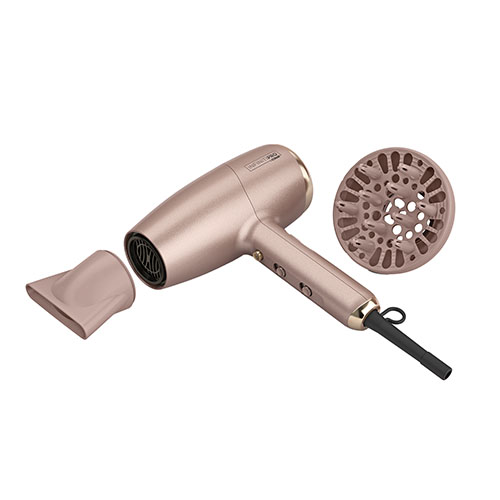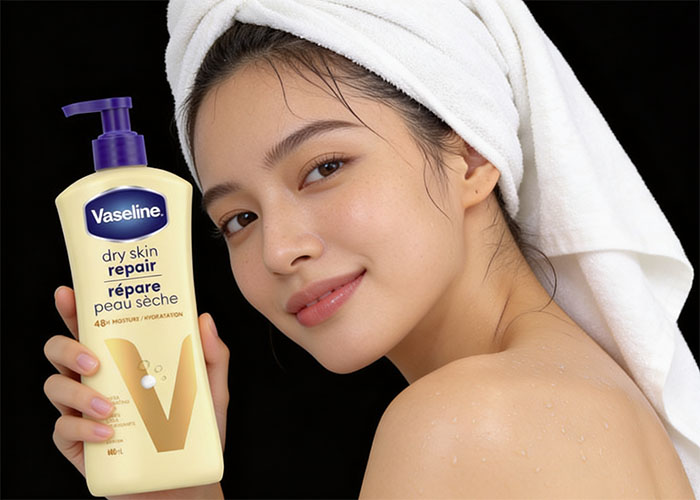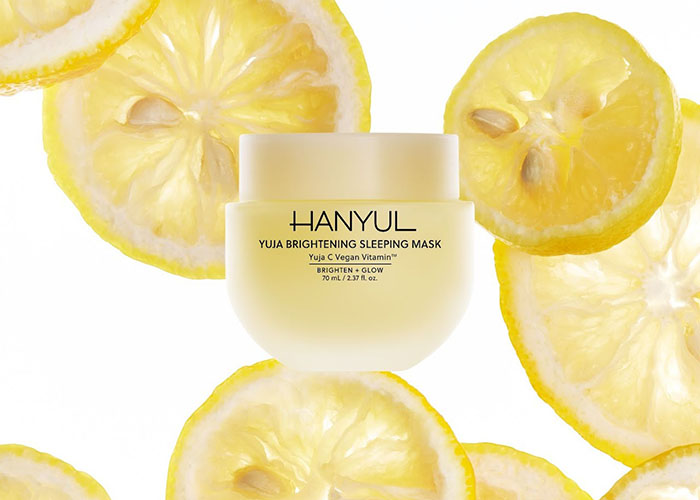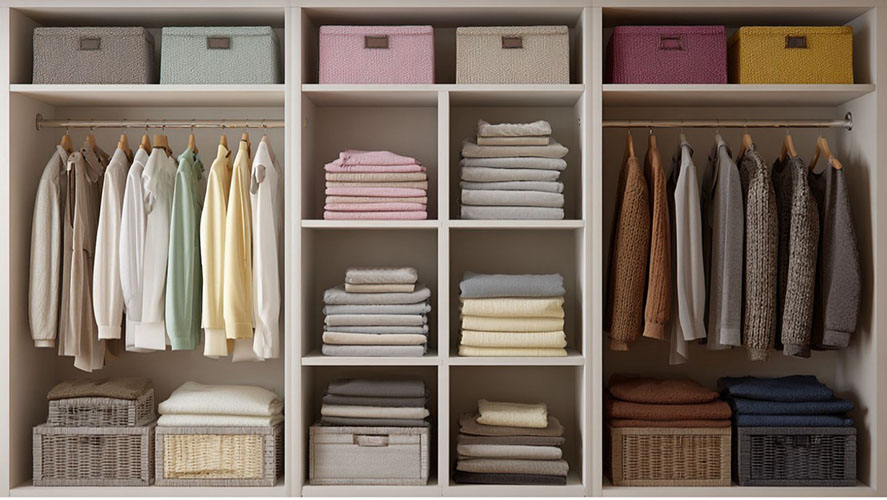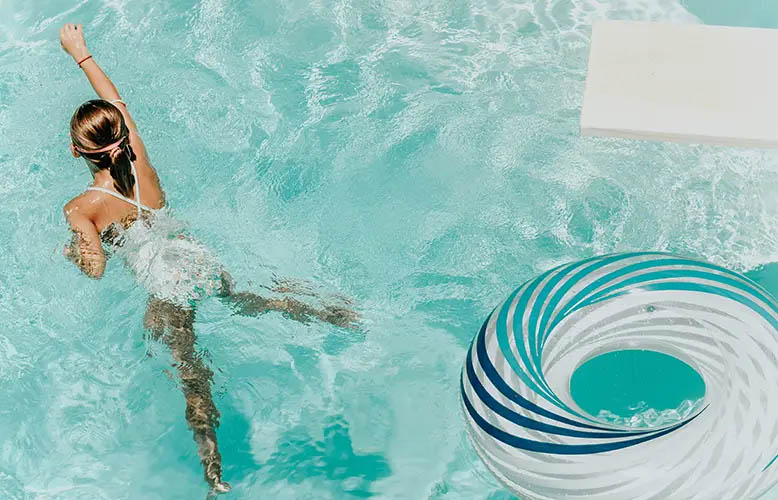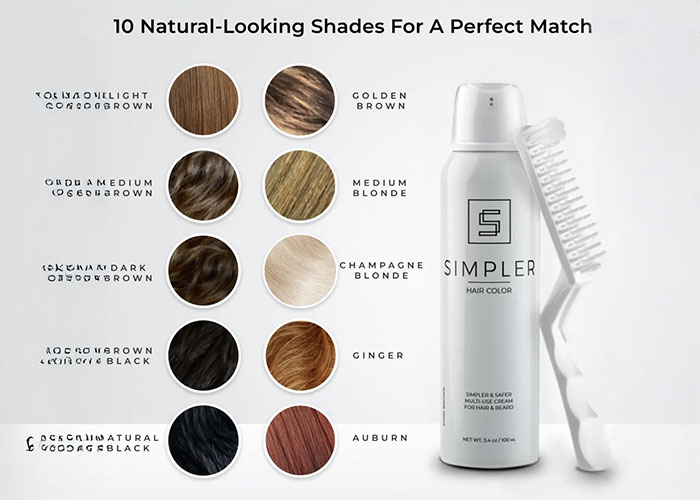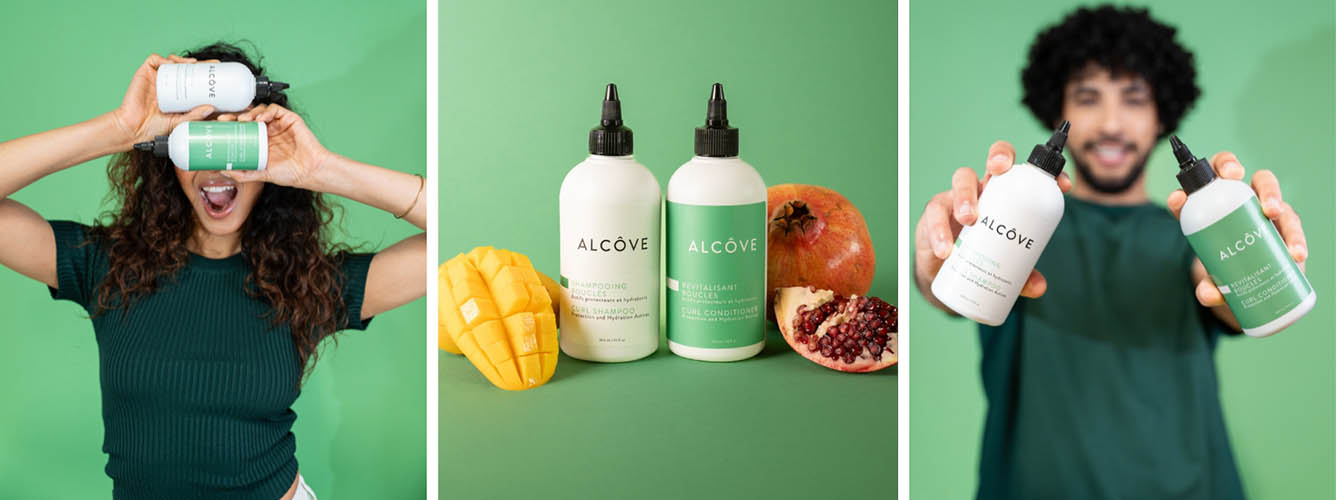A cool swim is one of summer’s great rewards. But the mix of chlorine, saltwater and intense sun can leave hair feeling rough long after you towel off. Dryness, color fade and a straw-like texture are all common complaints once water meets the hair cuticle.
To understand what’s happening and help stop damage before it starts, we asked Eliza Pineda, in-house hair expert at Mayraki Professional, for some advice on keeping strands strong all season.
Her first reminder? Prevention is kinder (and easier) than repair. Below, she unpacks the science behind water-related stress and shares practical tips to protect your hair through every stroke, splash and surf session of the summer.
Pool Water vs Ocean Water: Different Paths to Dryness
Not all summer water is the same. Pools rely on chlorine, while the sea and ocean surround you with salt. Each element stresses hair in its own way, so a quick chemistry lesson can help you protect your strands better.
Chlorine keeps pool water clean, yet it acts like a mild bleach on hair. It lifts the cuticle, strips away natural oils and leaves the surface rougher. Once that protective layer is thinned out, moisture escapes faster, and frizz, split ends and breakage become more likely to happen.
“Chlorine is essentially a type of bleach,” Pineda explains. “Like most bleaches, it can weaken the hair shaft and make it porous, leaving strands brittle and dry. Prolonged exposure can definitely cause chemical damage.”
Saltwater presents a different challenge. Minerals in seawater draw moisture out through osmosis, then leave a salty film behind. The result is hair that feels stiff or crunchy instead of the soft beach waves most of us imagine.
“Saltwater isn’t necessarily bad for hair but too much can lead to irritation and dryness,” Pineda says. “If your hair is colored or chemically treated, it can also speed up fading or discoloration.”
Pool or ocean, either one can wear down your hair’s protective layer. Once you know why, the next steps to prevent and repair if needed are easy.
Shield Your Strands Before You Swim
When it comes to pool or beach days, prevention beats repair every time. Pineda’s easiest rule: put something between your hair and the water.
“UV protection for the hair and scalp is non-negotiable,” she says. “It shields strands from the damage that builds up during long hours in the sun.” Spray-on SPF for hair works, and tossing on a wide-brim hat or light scarf adds some extra shade.
Next, she also recommends coating damp strands with leave-in conditioner or a nourishing oil. This thin layer locks in moisture and slows how quickly chlorine or salt can seep in.
“Hair oil, for example, Mayraki Ultimate Botanical Moisturizing Hair Oil, keeps the hair hydrated and forms a light, water-repelling seal,” Pineda adds.
Pro Tip: Apply the conditioner or oil right after a quick rinse so it spreads evenly and seals every strand.
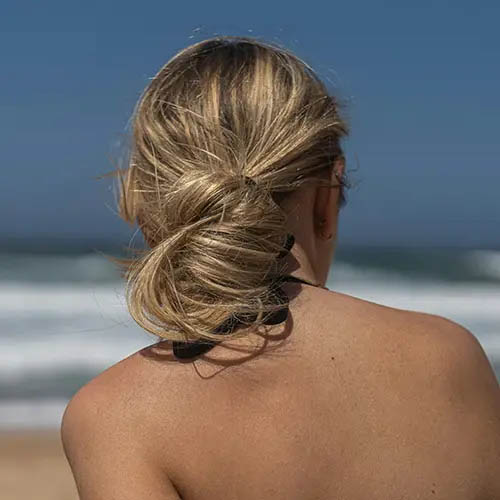
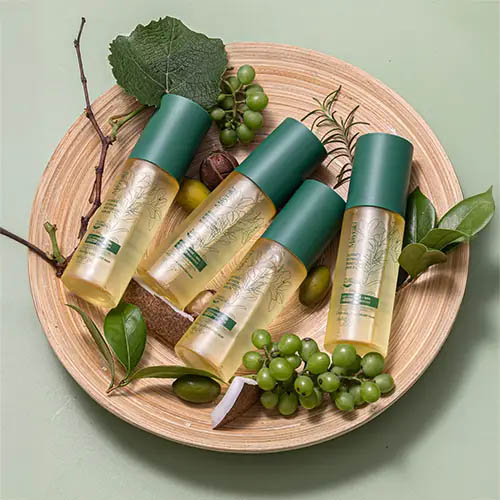
Quick Rinse, Lasting Protection
A quick rinse is the easiest way to protect hair once you step out of the pool or ocean. Skipping this step gives salt and chlorine time to settle in and pull out moisture.
“Rinsing right after you come out of the water is the simplest way to stop salt and chlorine from drying out your hair,” Pineda says. “A fast rinse washes away the residue before it has time to stick to your strands.”
No shower nearby? “You can also rinse your hair off in a nearby sink,” she adds. Or, pack a spare bottle of fresh water to do a quick rinse in a pinch.
Finish with a touch of leave-in conditioner or a light detangler to replace lost moisture and keep strands hydrated and smooth until your next shampoo.
How to Tell When Summer Fun Is Drying Out Your Hair
Not sure if pool days or salty waves have already taken a toll? Here are some signs that chlorine and saltwater are starting to stress your strands.
“Your hair will feel quite dry and brittle,” according to Pineda. “You’ll see frizz, feel stiffness and even hear a light ‘crunch’ when you touch it instead of it feeling soft and flexible.”
If that sounds familiar, don’t panic. Recovery starts simply with moisture.
“Start with a deep conditioner to restore lost moisture in your hair,” she advises. You can also try hair oiling, a treatment that involves massaging nourishing oils into the scalp and along the strands to replenish moisture and strengthen follicles.
“Keratin treatments are another great option,” she adds. These protein-rich formulas smooth the cuticle and rebuild weakened strands, though they work best when applied by a professional stylist or are a well-formulated at-home kit.
How Summer Stress Affects Different Hair Types
Every hair type can feel the effects of sun, salt and chlorine. Porosity, or the way your hair takes in and releases moisture, plays a big role in how much damage shows up.
“High-porosity hair is more vulnerable to water damage,” Pineda notes. “It absorbs water quickly and with it, chlorine and salt, as well.”
Porosity can be genetic, but it’s especially common in hair that is frequently colored, bleached or heat-styled. To find out where you land, Pineda suggests doing a quick check on your next wash day.
“If your hair saturates in seconds and dries just as fast, you’re working with higher porosity,” she explains. “If it takes longer to soak through and seems to hold water forever, even under a dryer, you have lower porosity.”
High-porosity strands need extra care before and after a swim.
- Load up on leave-in conditioner or oil.
- Rinse thoroughly.
- Finish up with a protein-rich mask or moisture-sealing cream or serum.
A little added protection goes a long way toward keeping those extra thirsty cuticles calm!
Swim Smarter with These Easy Poolside Care Tips
1. Tie it up! A loose braid, bun or swim cap keeps most of your hair out of direct contact with the water and reduces tangles later.
2. Skip the immediate shampoo. Shampoo can strip freshly soaked strands. First rinse thoroughly, apply a rich conditioner, and save the wash for later in the day if you still need it.
3. Clarify once a week. A gentle clarifying shampoo lifts away lingering chlorine, salt and product buildup.
4. Invest in silk for sleep. A silk pillowcase or scarf cuts down on friction while you sleep, so fragile, sun-exposed strands stay smoother and break less.
Don’t pause your hair care when you hit the pool or the beach. In fact, that’s where your strands need it the most! With the right prep, a quick rinse, and a little after-care, you can enjoy every swim while keeping your hair strong, shiny and ready for the next dip!







